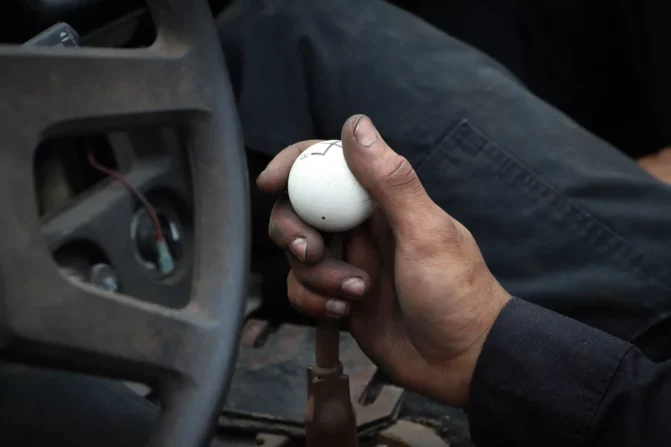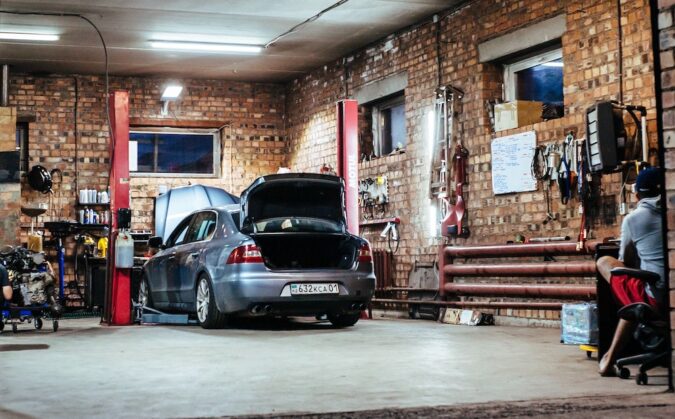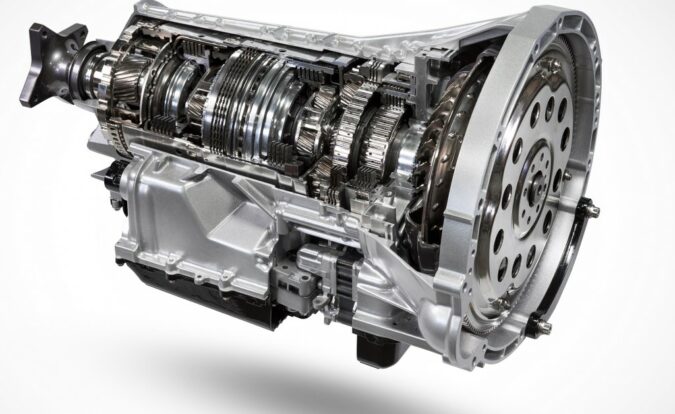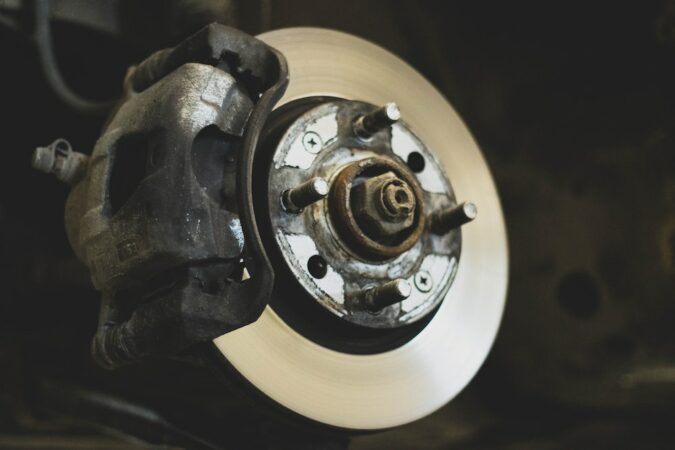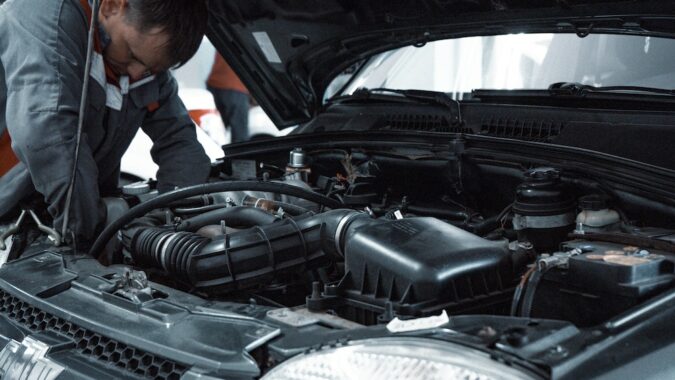Are you hearing some sounds when you put your car into reverse and you are asking yourself what is going on? Why car makes noise when put in reverse? If this is the situation that you are in, then you are at the right place because we are going to cover all of the possibilities when it comes to this problem appearing.
- Why Is Your Car Making Noises?
- Common Reasons For That Noise
- Transmission-Related Causes
- Brake System-Related Causes
- How To Fix This For Good?
- Final Conclusion
Learning how to troubleshoot is a smart move by yourself. Troubleshooting is a form of mastery and learning about the possible problems and causes will give you that extra edge when it comes to diagnosing a problem. Everything that happens in your car is caused by something.
It is up to you to connect the dots in your head the right way and diagnose a problem quickly and effectively. You don’t want to pay hundreds of dollars to mechanics to diagnose a simple thing like this. You can do everything at home using common tools and simple logic.
Especially for a problem like this when a car makes noise when put in reverse. Based on the reasons that we collected in our thorough research. We can say that this problem is not that serious and expensive to fix.
The important thing is to follow us carefully. First, we are going to learn what is this problem when car makes noise when put in reverse. Then we will discuss the two possibilities that are out there. One is transmission related and the second is brake-related. We will learn all the possible reasons why this happens and then we will learn how to solve this problem. So, if you want to learn more, follow along.
Is This Problem Normal
The car makes noise when put in reverse is audible information that the driver receives and determines that something is going on. Since this sound is probably not the normal behavior of his vehicle.
That’s why you need to learn your car, meaning that every driver should understand his car and notice when something is not right.
Most of the problems that happen in cars are producing symptoms from a visual nature or an audible nature. So, in order to become a good owner, you need to be aware of these things and notice them on time.
If you ignore audible signals, this is really bad. Imagine that the engine is making weird sounds like a rod knock or something similar. You push the car and next thing you know, you see a rod outside of the block and oil spilled everywhere. Not the best situation.
Another thing is misfires. If your car misfires and you are not aware. You are risking some spark plug issues to develop as well as an increase in fuel economy, low power output and so much more. Driving a car like this is dangerous.
And the third thing that we are covering right now is when car makes noise when put in reverse. Another audible signal that tells you that the car is not right and needs to be inspected.
The thing that we are trying to say is never to ignore unusual sounds that happen in your car. Anything unusual that you hear might indicate a problem and this problem needs solving. Like in this case where the car makes noise when put in reverse.
Is It Safe To Drive
So, why it is important for you to inspect the matter and learn why car makes noise when put in reverse? It is very important I must tell you.
This is the case because this indicates that there is something wrong with your car. I can tell you from now on that this problem isn’t that serious and it is easily fixable if you know the reasons why does it happen. But more on that a bit later.
What is important to understand now is that the car is in a state of emergency. Whenever you notice something like this, you need to be careful and make sure that the car is not overloaded or something else that could possibly damage it happens to the engine or any other internal component.
Whenever you push the vehicle in these situations is really bad and will make things worse. Keeping car at moderate speeds will guarantee that your vehicle is in something like a safe mode.
Imagine that the car makes noise when put in reverse. This noise could be from some sensible components that need to work at all costs because, without them, you will not be able to maneuver the car right and make it stop whenever needed.
But what are the reasons why car makes noise when put in reverse? Well, that’s what we are going to discuss in the following chapters when we are going to learn all of the different reasons why this problem happens and how you can solve it quickly and effectively. So, if you want to learn more, follow along.
Why Does My Car Make Noises
Now let’s elaborate on the reasons why car makes noise when put in reverse. It is worth noting that these noises can be caused by two things.
The first thing that can cause car makes noise when in reverse is the transmission in both manual and automatic vehicles. The second thing that can make noise while in reverse is the brakes.
In the following chapters, we are going to elaborate on these causes. First, we are going to learn why the transmission can cause the car makes noise when put in reverse and then we will cover the brake-related issues. Now let’s start covering the topic.
Transmission Problems
As we said, first we are going to learn the transmission-related problems that might pop out and make the car makes noise when put in reverse.
We will focus on both automatic as well as manual transmission cars since both of these types of transmissions can make noises when put in reverse. Now let’s elaborate on the issue.
Car Makes Noise When Put In Reverse, Causes #1. Automatic Transmission Problems
The first reason of car makes noise when put in reverse is a problem with your automatic transmission. More precisely problems with the reverse gear.
This sound might sound like grinding or humming and will come from the center console where the transmission is located down below.
Other symptoms might also include jerking and an overall unpleasant experience when you put your car in reverse gear.
The reason for this might be worn clutches, bad transmission fluid, bad transmission valve body, and other important bits and pieces that are known to wear on the transmission and cause this problem to appear.
In the worst case, the whole transmission will require to be overhauled and components inside to be replaced to sort this problem.
So, in order to make sure that your transmission is the problem. Try to listen from where the sound comes from, if it comes from the center console then this is highly likely caused by the transmission. On the other hand, if car makes noise when put in reverse and the noise doesn’t come from the center stack, you should look for your problem elsewhere. Now let’s move on to the next probable cause in case we are dealing with a manual car.
Car Makes Noise When Put In Reverse, Causes #2. Manual Transmission Problems
Now let’s discuss why car makes noise when put in reverse if it is a manual transmission car. Manual transmissions work differently and break differently. Meaning that in a manual transmission, you cannot expect the same situation as in the case when you are driving an automatic transmission. So, what are the probabilities? Let’s elaborate.
Car Makes Noise When Put In Reverse, Causes #3. Reverse Gear Whirring Noise
When car makes noise when put in reverse a probable reason can also be the reverse gear itself on the manual transmission. So, why is this the case in the first place?
Well, this is the case, because the reverse gear is using a different design. Also known as a spur gear. This gear is not like the forward helical design gears.
All forward gear teeth are placed at an angle. That’s why this type of gear is known as helical gear. But the rear gear is a conventional gear that is not at an angle. Meaning that this gear makes a different type of noise.
You have probably seen how race cars produce a whirring sound when going forward. This is the case because all of the forward gears on the race car are spur gears. That’s why racing transmissions are so noisy.
The helical design makes the manual transmission a lot more bearable when you drive the car since this design does not produce sound.
But still one of the gears is a spur gear like the reverse one. When you place your car in gear, the sound is not that noticeable. But as you speed up, the noise gets louder and louder.
This whirring noise that comes from the transmission is not something dangerous and is completely normal when you drive a manual car (it’s a good idea to properly learn how to drive a manual car). So, when the car makes noise when put in reverse and this is the cause, you don’t have to worry much. Now let’s move on to the following reasons.
Car Makes Noise When Put In Reverse, Causes #4. Worn Clutch And Dual-Mass Flywheel
Another probable cause for this problem, when car makes noise when put in reverse, is the worn clutch and flywheel if you drive a manual car.
The clutch is the one component that allows you to go in gear and the flywheel works with the clutch. The flywheel is the part that is most expensive to replace in this set and can cost a good amount of money to get this sorted out. More precisely about $700 for the parts alone.
The labor is also $1,000+. So, if this sound appears and you are driving a manual, you need to take these things further and diagnose the problem. You can drive the car as it is. But one day the flywheel will fail completely and you will not be able to drive the car.
It is worth noting that this problem happens mostly on dual-mass flywheels installed in VAG vehicles that are running front-wheel drive. VAG is referring to Volkswagen Group if you don’t know.
The only way to solve this problem when car makes noise when put in reverse is to replace the whole set of a clutch flywheel and throwout bearing. You might pay more but you will be good for another 60,000 miles after this work is done to your car. Now let’s move on to the other possible problems out there.
Car Makes Noise When Put In Reverse, Causes #5. Transmission Fluid Levels
Low or contaminated transmission fluid can also cause your car to make noises when put in reverse. The transmission fluid is essential for the proper functioning of your transmission as it lubricates the gears and other components. If the fluid level is low, it may cause the gears to grind against each other, resulting in a noise. Similarly, if the transmission fluid is old or contaminated, it may not provide adequate lubrication, leading to noise and potential damage.
To avoid this, it is crucial to check your transmission fluid levels regularly and change the fluid according to the manufacturer’s recommendations. If you notice the fluid is low, top it up with the appropriate type of transmission fluid for your vehicle. If the fluid is dark or has a burnt smell, it may be time for a transmission fluid change.
Car Makes Noise When Put In Reverse, Causes #6. Faulty Torque Converter
The torque converter is a component of the automatic transmission that transfers power from the engine to the transmission. It is filled with transmission fluid and contains a turbine, a stator, and a pump. If any of these components are damaged, it can cause the torque converter to make a noise when you put your car in reverse.
A faulty torque converter can produce a variety of noises, including a whirring, humming, or clicking sound. If you hear any of these noises when you put your car in reverse, it could be a sign that your torque converter is failing.
It is essential to address this issue as soon as possible as a faulty torque converter can lead to more severe transmission problems. A professional mechanic can diagnose and repair the issue for you.
Car Makes Noise When Put In Reverse, Causes #7. Damaged CV Joint
The CV (constant velocity) joint is a crucial part of your car’s drivetrain that allows the wheels to move up and down while simultaneously turning. A damaged or worn-out CV joint can cause a clicking or popping noise when you put your car in reverse or turn your vehicle.
To check for a damaged CV joint, turn your steering wheel all the way to one side and then reverse your car. If you hear a clicking or popping noise, it could indicate a damaged CV joint. It is important to address this issue promptly as a failing CV joint can lead to a loss of vehicle control.
Car Makes Noise When Put In Reverse, Causes #8. Loose or Damaged Belt
A loose or damaged belt in your car’s engine can also cause a noise when you put your car in reverse. The belts in your engine drive various components such as the alternator, water pump, and power steering pump. If any of these belts are loose or damaged, it can cause a squealing or chirping noise when you put your car in reverse.
To check for a loose or damaged belt, open your car’s hood and inspect the belts for any signs of wear, cracks, or looseness. If you notice any issues, it is important to replace the belt as soon as possible to avoid further damage.
Car Makes Noise When Put In Reverse, Causes #9. Damaged Universal Joint
The universal joint (U-joint) is a component of your car’s driveshaft that allows it to move up and down and rotate. A damaged U-joint can cause a clunking or knocking noise when you put your car in reverse or when you accelerate or decelerate.
To check for a damaged U-joint, safely jack up your vehicle and inspect the driveshaft for any signs of wear or damage. If you notice any issues, it is crucial to replace the U-joint as soon as possible to avoid further damage.
Car Makes Noise When Put In Reverse, Causes #10. Engine Mounts
Engine mounts hold the engine in place and absorb vibrations from the engine. If the engine mounts are worn or damaged, it can cause the engine to move excessively when you put your car in reverse, resulting in a noise. The noise may be more noticeable when you accelerate or decelerate.
To check for worn or damaged engine mounts, open your car’s hood and inspect the engine mounts for any signs of wear or damage. If you notice any issues, it is important to replace the engine mounts as soon as possible to avoid further damage.
Brake Problems
Now let’s discuss some other reasons why car makes noise when put in reverse. These reasons are brake-related and have nothing to do with the transmission ones that we covered before.
These problems are slightly less serious than the other problems that we covered above. But they still can be a real pain to deal with and sort out. Especially if you are a beginner and do not know a lot about cars.
Just to note, when you have transmission issues you have whirring or grinding noises. But when it comes to brakes, the noises are rather different. Squealing or squeaking in most cases. But why car makes noise when put in reverse? Well, that’s what we are going to cover in the following chapters where we will elaborate on this issue.
Car Makes Noise When Put In Reverse, Causes #11. Car Was Not Driven And Rotors Are Rusted
The first probable cause of why car makes noise when put in reverse is because the car was not driven for a longer period.
Imagine that your car was parked in a garage (fun fact, go check out our guide on the square footage for 2 car garage) after you washed it and it sat there for a week or more. In this situation, the water that splashed the rotors has created a small amount of rust on the rotors. This rust will make the rotor make noise when you put the car to reverse to remove it from the garage.
Another situation is when the car was sitting for 5+ years. The rotors have probably rusted out. This rust is doing nothing well and can cause the car make noise when put in reverse to develop. For this problem, you will have to remove and replace the rotors and pads with new ones. Now, let’s move on to the next probable cause.
Car Makes Noise When Put In Reverse, Causes #12. Brake Pads Are Worn
Another probable reason why car makes noise when put in reverse are the brake pads. They wear as you know and can cause some unpleasant noises to develop in your vehicle.
How you can tell if the brake pads are worn and make the noise? You can simply check the wear tabs on the pads and see the condition of the brake pads.
The brake pads should always have a few millimeters of meat on them. If they don’t then you probably are having worn brake pads on your car and these pads are known to squeak and make unpleasant noises like the car makes noise when put in reverse. Now, let’s move on to the next possibility.
Car Makes Noise When Put In Reverse, Causes #13. Brake Pads Are Low Quality
Another reason a car makes noise when put in reverse is a set of low-quality brake pads. Some pads are not that good when it comes to doing their job.
The cheap brake pads are the most affected by this problem and if you have cheap pads installed on your car, you can expect them to produce noises like the car makes noise when in reverse. The only way around this would be to install new brake pads and replace these cheap ones that are doing no good for you and cause situations like this.
Car Makes Noise When Put In Reverse, Causes #14. No Grease On The The Brake Pad Shims
Another problem with brake pads that can make the car makes noise when put in reverse is the lack of grease on the brake pad shims.
When brake pads are installed, you need to apply grease on the side that is not used for stopping the car. This grease will reduce the brake friction and will make sure that you don’t experience weird noises.
So, if you recently installed pads and you didn’t apply grease on them, do this as soon as possible if you want to avoid situations like the car make noise when put in reverse to happen.
Car Makes Noise When Put In Reverse, Causes #15. Warped Rotors
Another common reason for car makes noise when put in reverse are warped rotors. That’s right, rotors might get warped and deformed.
Meaning that whenever they are in this condition, your vehicle will not drive as it should. The rotors will simply rub against the brake pads constantly and this rubbing can make you really uncomfortable and annoy you in general.
Sadly, the only solution for warped rotors is to replace the rotors that are bad with new ones and this will hopefully solve your problem with car makes noise when put in reverse permanently.
Car Makes Noise When Put In Reverse, Causes #16. Seized Brake Caliper
A seized caliper can also cause the car makes noise when put in reverse. So, why is this the case? This is the case because the piston of the brake rotor is not working right. Meaning that the piston is out and doesn’t want to get completely in.
When the piston is out it applies pressure on the brake pad and the brake pad makes a contact with the rotor and causes noise to develop like in this situation with the car makes noise when put in reverse. The solution for this will require replacing the caliper with a new one.
Car Makes Noise When Put In Reverse, Causes #17. Handbrake Is On
Another silly reason why car makes noise when put in reverse is that the handbrake is on. This is one of the most common reasons why the car makes noise when in reverse in general.
People often forget the car’s handbrake and put the car in reverse and head up to work. Especially if the handbrake doesn’t hold well. This often goes unnoticed by the owner except for some minor noise. When the owner realizes this, the brakes will overheat.
That’s why make sure that you always check the light and see if your hand brake is on. If it’s on, it means that you need to deactivate the handbrake if you want to solve the car makes noise when put in reverse problem. But how you can solve this problem. Let’s see in the following chapter.
Car Makes Noise When Put In Reverse, Causes #18. Dust And Debris Accumulation
Accumulation of dust and debris in the braking system can be another reason for noise when reversing. Sometimes, small stones or debris can get lodged between the brake pad and the rotor. This can cause a grinding or scraping noise when the car is put in reverse. Additionally, brake dust accumulation can cause squeaking sounds.
To avoid this issue, it is essential to have your brakes cleaned regularly by a professional. If you hear any abnormal noise while reversing, it is advised to get your brakes inspected immediately.
Car Makes Noise When Put In Reverse, Causes #19. Worn Brake Shoes
For vehicles with drum brakes at the rear, worn brake shoes could be a potential reason for noise when reversing. Brake shoes are the friction material used in drum brakes. Over time, the brake shoes wear down and may cause a grinding noise when the brakes are applied, especially in reverse.
If you hear a grinding noise when reversing, it is important to get the brake shoes inspected and replaced if necessary. Delaying this repair could lead to further damage to the brake drums and other components.
Car Makes Noise When Put In Reverse, Causes #20. Glazed Brake Pads and Rotors
Glazing of the brake pads and rotors is another potential cause of noise when reversing. Glazing occurs when the brake pads get too hot, causing the pad material to crystallize and form a shiny surface on the pads and rotors. This can cause a squeaking or squealing noise when the brakes are applied.
To fix this issue, the glazed pads and rotors will need to be replaced with new ones. Additionally, it is important to address the root cause of the overheating, which could be due to aggressive driving, dragging brakes, or other issues.
Car Makes Noise When Put In Reverse, Causes #21. Damaged Brake Shield
A damaged or bent brake shield can also cause noise when reversing. The brake shield, also known as the dust shield, is a thin metal plate located behind the brake rotor. Its purpose is to protect the brake components from debris and water.
If the brake shield is damaged or bent, it may come in contact with the brake rotor, causing a scraping noise when the wheel rotates. This noise may be more noticeable when reversing as the wheel rotates in the opposite direction.
To fix this issue, the damaged brake shield will need to be straightened or replaced.
Car Makes Noise When Put In Reverse, Causes #22. Incorrectly Installed Brake Components
Incorrect installation of brake components can lead to noise when reversing. If the brake pads, rotors, or calipers are not installed properly, it can lead to abnormal contact between the components, causing noise.
For example, if the brake pads are not seated correctly in the caliper, it may cause a clicking or popping noise when the brakes are applied. Similarly, if the rotors are not installed properly, it may cause a scraping or grinding noise.
If you suspect that the brake components are not installed correctly, it is important to get them inspected and corrected by a professional.
Car Makes Noise When Put In Reverse, Causes #23. Brake Line Obstruction
An obstruction in the brake line can also cause noise when reversing. If there is air or debris in the brake line, it can cause the brake fluid to become compressible, leading to a soft or spongy brake pedal. This can cause the brake pads to vibrate against the rotors, creating a humming or buzzing noise.
To fix this issue, the brake lines will need to be bled to remove any air or debris. This should be done by a professional to ensure that the brake system is functioning properly.
In conclusion, there are several potential brake-related causes for noise when reversing. It is important to address any abnormal noise as soon as possible to avoid further damage to the braking system or other components. Regular maintenance and inspection of the braking system can help prevent many of these issues.
How To Fix
Fixing car makes noise when put in reverse problem can depend much on what is the problem in the first place.
If it is an automatic transmission issue. This would probably require a transmission rebuild that can cost about $1,500 or more in some situations.
If the problem is caused by the manual transmission. You should know that noise in reverse on a manual is normal because of the reverse gear. Also if you own a Volkswagen or an Audi, this problem could be caused by the double mass flywheel. This is expensive work to get completely sorted and could cost you about $1,500 in total or more in some cases.
If the problem is brake-related, then you are good. These problems are solved quickly and effectively in a matter of an hour or so. You will replace the affected component and you can continue driving. The least you can pay is about $25 for a new pad and the most expensive is to pay about $200 for a rotor and pad install. Overall, that’s it when it comes to fixing the car makes noise when put in reverse.
Groaning Sounds – Need-to-Know Facts
- A groaning noise when reversing can be due to a bad braking system, damaged sway bar bushing, collision of dust shield with the brake rotor, or broken constant velocity (CV) joints.
- Brake pads are the most common cause of moaning, grinding, or groaning noise from the car when reversing. When the brake pads rub against the disc (rotor), the disc is heated up by friction, causing it to deform and rub against the brake pads.
- A faulty wear tab of a brake caliper can also cause a moaning noise when backing up. The wear tab is meant to scrape the disc when it’s time to replace the brake pads.
- Damaged sway bar bushing can cause a groaning noise when turning and reversing. Sway bar bushings are used to reduce vibration and perform as a fulcrum of the sway bar as they keep it attached to the frame of the vehicle.
- A loose retaining clip on the brake can cause a light brake pedal pressure (for more context, check out our overview of which one is the brake) when reversing a car to produce a groaning sound.
- The dust shield can cause a groaning or creaking noise from the car when reversing without applying brakes. It is a thin bendable piece of metal on the back of the brake disc that protects the brake rotors, calipers, and pads by shielding them from environmental particles.
- A small stone that is caught between the wheel and the brake pad may result in grinding or squealing noises when reversing.
- A bad motor mount can cause a single loud knock or bang when putting the car in reverse from parking mode. Motor mounts are used to dampen and isolate the vibrations of the engine from the rest of the car.
- Reverse gear noise is normal as it is a spur gear that meshes with each other abruptly and does not allow a smooth load distribution like helical gears.
- To verify bad engine mounts, pop the hood, and ask a friend to shift from parking to reverse while watching the engine. If the engine moves a lot when it goes into reverse, it could mean that the motor mounts are bad.
In Conclusion…
In this article we have covered a lot about the car makes noise when put in reverse. First, we learned more about this problem and elaborated on the reasons why does it happen in the first place.
The most probable causes for this problem are transmission issues and brake issues. The transmission issues can be more serious and expensive to repair. Unlike the brake issues that are relatively simple and cheap to do.
We also elaborated on the costs involved in fixing this problem. On average, that’s how much it is going to cost you to fix the car makes noise when put in reverse problem.

